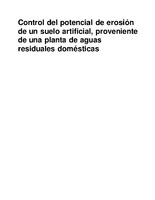Control del potencial de erosión de un suelo artificial, proveniente de una planta de aguas residuales domésticas
Abstract
The geotechnical characterization of an artificial
soil has been made. The mud used was taken
from a domestic waste water treatment plant. For
evaluating this characterization, tests on
consistency limits, granulometry through
hydrometers, Proctor standard, permeability and
specific gravity were made.
An environmental characterization of this artificial
soil was also made. Data from a parallel
investigation for a possible usage of this material
in agricultural activities of this same material was
used for this characterization.
A complementary part of this investigation is
focused in analyzing the erosion potential of this
artificial soil due to the effects of rainfall.
In order to measure soil erosion, a hydrologic
simulator was designed in order to control the
intensity of rainfall that could reproduce
precipitations able to produce soil erosion. The
simulator has a hydraulic system that controls the
pressure of its four sprinklers. This way, intensity
inside the simulator can be quantified.
An acrylic tray with an exposed area of 0, 25 m2
and a thickness of 0, 1 m, was built in order to
place the soil material and to simulate a slope.
This tray has a canoe in its base that allows
measuring runoff and soil erosion; as well as
holes of the bottom where the infiltration was
measured.
Finally, many tests were made by adding different
kinds of cement to this artificial soil material. The
purpose of this was to find the optimal percentage
of cement to lower erosion of the new artificial soil
taking into consideration price minimal costs as
well.
Description
Proyecto de Graduación (Licenciatura en Ingeniería en Construcción) Instituto Tecnológico de Costa Rica, Escuela de Ingeniería en Construcción, 2016.


